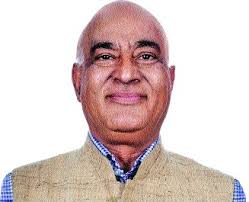Synchronised elections, voter behaviour, and governance outcomes
An active policy proposal of the Government of India is to hold national elections at the same time as the assembly elections of all the states. This article examines whether holding national and stat...
-
 Vimal Balasubramaniam
Vimal Balasubramaniam  Sabyasachi Das
Sabyasachi Das  Apurav Yash Bhatiya
Apurav Yash Bhatiya  28 August, 2020
28 August, 2020
- Articles
Political determinants of newspaper markets in India
Newspapers are an important source of political information for Indian voters. This article looks at how political factors influence the newspaper market. Using the announcement of delimitation in the...
-
 Julia Cagé
Julia Cagé  Guilhem Cassan
Guilhem Cassan  Francesca R. Jensenius
Francesca R. Jensenius  23 November, 2023
23 November, 2023
- Articles
A proposal for public funding of elections and political parties in India
The Finance Minister of India recently introduced measures aimed at cleaning up political party funding in the country. In this article, Gowda and Santhosh highlight the limitations of these measures,...
-
 M.V. Rajeev Gowda
M.V. Rajeev Gowda  Varun Santhosh
Varun Santhosh  21 April, 2017
21 April, 2017
- Perspectives
Citizens' trust in local politicians and implications for good governance
The new state of Telangana was carved out of Andhra Pradesh in June 2014, after a prolonged movement by the people of Telangana region for a separate state. Based on field experiments among citizens ...
-
 Lata Gangadharan
Lata Gangadharan  Tarun Jain
Tarun Jain  Pushkar Maitra
Pushkar Maitra  Joseph Vecci
Joseph Vecci  10 June, 2015
10 June, 2015
- Articles
How effective are gram sabhas?
Village panchayats across India are mandated to organise local public meetings called gram sabhas several times a year, wherein villagers discuss issues such as local public good provision. This colu...
-
 Sabyasachi Das
Sabyasachi Das  06 May, 2015
06 May, 2015
- Articles
14th Finance Commission: A trust-based approach towards local governments
The 14th Finance Commission has been hailed as ‘path-breaking’ for recommending larger fund allocations to state governments and giving them more autonomy in spending these funds. In this article...
-
 Meera Mehta
Meera Mehta  Dinesh Mehta
Dinesh Mehta  27 April, 2015
27 April, 2015
- Perspectives
The Chhattisgarh experience and the National Food Security Act
Many of the reforms introduced under the National Food Security Act are modeled on PDS reforms implemented in Chhattisgarh. These reforms are widely believed to be responsible for the state’s succe...
-
 Prasad Krishnamurthy
Prasad Krishnamurthy  Vikram Pathania
Vikram Pathania  Sharad Tandon
Sharad Tandon  20 April, 2015
20 April, 2015
- Articles
Maoist violence and MNREGA
The spate of Maoist attacks on security personnel in Chhattisgarh this week serves as a reminder that Moaist insurgency is the single biggest internal security threat faced by India. This column anal...
-
 Gaurav Khanna
Gaurav Khanna  Laura Zimmermann
Laura Zimmermann  15 April, 2015
15 April, 2015
- Articles
Strategically greasing the wheels: The political economy of India’s rural employment guarantee scheme
Inefficient and capacity-constrained bureaucracies often pose a significant hurdle to the effective implementation of anti-poverty programmes in developing countries.
-
 Aditya Dasgupta
Aditya Dasgupta  James Robinson
James Robinson  31 March, 2015
31 March, 2015
- IGC Research on India
Should the less educated be barred from village council elections?
In December 2014, the state government of Rajasthan issued an executive order barring citizens with less than eight years of formal education from running for village council chief elections in all b...
-
 Rohini Pande
Rohini Pande  23 February, 2015
23 February, 2015
- Perspectives
Three concerns about AAP's promise
The Aam Aadmi Party (AAP) has come to power in Delhi with a historic mandate. In this article, V Ramani, Partner at Access Advisory and former bureaucrat, flags three key concerns around their approa...
-
 V. Ramani
V. Ramani  18 February, 2015
18 February, 2015
- Perspectives
An economist's view on the new government's initiatives
In this article, Pranab Bardhan, Professor of Economics, University of California, Berkeley, provides his perspective on some of the initiatives of the new Indian government at the centre in their fi...
-
 Pranab Bardhan
Pranab Bardhan  19 December, 2014
19 December, 2014
- Perspectives
Response to the Bhagwati-Panagariya rejoinder on MNREGA
In a recent article, Abreu et al. refuted the Bhagwati-Panagariya argument for phasing out MNREGA in favour of cash transfers. In this article, Abreu et al. respond to claims in a rejoinder by Bhagwa...
-
 Dilip Abreu
Dilip Abreu  Pranab Bardhan
Pranab Bardhan  Maitreesh Ghatak
Maitreesh Ghatak  Ashok Kotwal
Ashok Kotwal  Dilip Mookherjee
Dilip Mookherjee  Debraj Ray
Debraj Ray  14 December, 2014
14 December, 2014
- Perspectives
Assessing the quality and usefulness of MNREGA assets in Maharashtra
Questions have been raised regarding the quality and usefulness of assets created under MNREGA. To examine the validity of the scepticism, this column reports results from a study of MNREGA assets in...
-
 Upasak Das
Upasak Das  Ashwini Kulkarni
Ashwini Kulkarni  Sudha Narayanan
Sudha Narayanan  Krushna Ranavare
Krushna Ranavare  05 December, 2014
05 December, 2014
- Articles
Building state capacity for better programme implementation: Lessons from the Andhra Pradesh Smartcard Programme
Biometric payment systems are posited to reduce leakages in public welfare programmes but there is limited evidence on their effectiveness. This column presents evidence on the impact of the Andhra P...
-
 Karthik Muralidharan
Karthik Muralidharan  Paul Niehaus
Paul Niehaus  Sandip Sukhtankar
Sandip Sukhtankar  03 December, 2014
03 December, 2014
- Articles
Twitter feed
Tweets by Ideas4IndiaMost Popular Governance Posts
Unique Health Identification and Aadhaar: A case for mandatory linkage
As part of the Digital India initiative, All India Institute of Medical Sciences (AIIMS) issues a Unique Health Identification (UHID) number to each patient, which documents their entire journey in th...
 Mudit Kapoor
Mudit Kapoor  23 December, 2016
23 December, 2016
- Perspectives
Caste dominance in rural India: Cause and effect
Rural India remains a caste-based society. This column explores why caste continues to play such an important role and what the effects are. It argues that trade and agricultural productivity suffer, ...
 Siwan Anderson
Siwan Anderson  16 August, 2012
16 August, 2012
- Articles
Why did the Indian economy stagnate under the colonial rule?
How did the Indian economy fare under the colonial rule? Is the average Indian significantly better off after Independence? This column examines trends in GDP per capita in order to determine the stan...
 Aniruddha Bagchi
Aniruddha Bagchi  16 September, 2013
16 September, 2013
- Articles





 16 November, 2023
16 November, 2023






